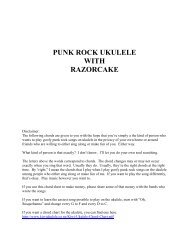Create successful ePaper yourself
Turn your PDF publications into a flip-book with our unique Google optimized e-Paper software.
RICH MACKIN<br />
RICH MACKIN<br />
I first decided to write this<br />
when I was talking to my friend<br />
Sally about how being accused of<br />
assault caused me to research the<br />
subject. I noticed that there is a lot<br />
of material written about avoiding<br />
sexually assault and a lot of material<br />
about what to do if you have<br />
been sexually assaulted, but there<br />
isn’t much written about how to<br />
make sure that you never find yourself<br />
in a position where your<br />
actions might be considered sexual<br />
assault.<br />
There is plenty of information<br />
for women, but not much for males,<br />
and surely not for “guys” (to denote<br />
what would be called the “average<br />
American male”). Since most sexual<br />
assault is male on female, there<br />
clearly is a need for this information.<br />
“We teach our daughters to<br />
say ‘no’ to intercourse – and we<br />
hardly say anything to our sons” is<br />
clearly stated in the handbook<br />
against assault, No is Not Enough<br />
(Adams, Fay, M.A., Loreen-<br />
Martin). Bell hooks, in Feminism Is<br />
for Everybody, says, “No significant<br />
body of feminist literature has<br />
appeared that addresses boys.” The<br />
more I read about sexual assault,<br />
gender issues, and feminism, I<br />
found more information that I<br />
thought most men should read. But<br />
most of it was hidden in books<br />
clearly marketed towards female<br />
feminists or in books with title like<br />
Transforming a Rape Culture,<br />
which doesn’t exactly appeal to you<br />
as something to read in a park<br />
under a tree on your day off or in<br />
bed before sleeping.<br />
I acknowledge that talking<br />
about how actions might be considered<br />
sexual assault can seem<br />
strange. “If she says no, it’s rape,”<br />
right? Obviously. Of course. What<br />
if she doesn’t say “no,” but “I don’t<br />
think so” or “I don’t think this is a<br />
good idea” or even “maybe”?<br />
Maybe is part no and part yes.<br />
Arguably, a person should be clearer<br />
about their interest level, but<br />
shouldn’t the person initiating be<br />
seeking out a definite answer? Not<br />
“maybe,” not “I guess,” but “YES!”<br />
18 If you are initiating<br />
THE TWISTED BALLOON<br />
I COULDN’T EXACTLY SAY THAT HE ROBBED ME, BUT I DIDN’T FEEL<br />
THAT HE WANTED THE DOLLAR OF MY OWN FREE WILL.<br />
sexual activity, it is your responsibility<br />
to make it completely and<br />
absolutely sure that it is desired, not<br />
just that there is a lack of resistance.<br />
You shouldn’t “think” the<br />
other person is interested. You<br />
should be completely, absolutely<br />
sure without doubt of any sort. If<br />
you feel confident that the interest<br />
is there, what harm is a verbal confirmation<br />
going to do you?<br />
That’s so simple, but also rather<br />
unusual. In some ways, part of the<br />
excitement of sex and romance is<br />
not knowing what the other person<br />
is thinking and trying to figure out<br />
what is going on between you. The<br />
difference with active consent can<br />
be as simple as erring on the side of<br />
caution unless intent and consent is<br />
clear. A lot of discussion in an<br />
activist group that discusses these<br />
issues is, “Are we willing to get<br />
laid less for the revolution?” I think<br />
it’s not a question of getting “laid”<br />
less, but risking a night or two here<br />
and there to make sure that one’s<br />
“getting laid” isn’t the other person’s<br />
feeling pressured, or worse.<br />
We all should be aware and<br />
responsible for inequities when initiating<br />
sexual contact. Is one person<br />
bigger than the other? Older?<br />
Drunker? Is one a rock star and the<br />
other a fan? Teacher and student? If<br />
you are a six and a half foot tall<br />
man who is built like a wrestler,<br />
you don’t have to only date women<br />
who can fend you off, but you DO<br />
need to be aware that others might<br />
be intimidated by you, so you are<br />
responsible for understanding,<br />
acknowledging, and respecting that<br />
such intimidation MIGHT exist,<br />
and how it effects the other’s<br />
actions. Indeed, in many situations<br />
my own actions made women<br />
uncomfortable not for my intent to<br />
oppress or dominate, but for a complete<br />
lack of empathy for inequities<br />
of the situation and our relationship.<br />
This is the basic idea of privilege<br />
– that one person might have<br />
an upper hand that another does<br />
not. Usually, this privilege is directly<br />
linked to not being aware of the<br />
privilege unless one takes a<br />
moment to consider it. It can be<br />
simple as the fact that I, as a man,<br />
can take my shirt off on a hot day,<br />
and it just means I am hot. A<br />
woman doing the same is thought<br />
to be making a sexual overture.<br />
Unfortunately, this important concept<br />
is generally not discussed, and<br />
when it is, it’s almost exclusively<br />
by angry people who use it to<br />
scapegoat and overgeneralize –<br />
because men, as a gender, have<br />
privilege, white people as a race<br />
have privilege, etc. But anyone<br />
who tries to tell you ALL white<br />
people have it easy, or ALL men<br />
have it better than ALL women,<br />
well, the simple term for that is<br />
WRONG.<br />
I bring up men and women<br />
because, yes, most sexual transgressions<br />
and violence are done by<br />
men. Most victims are women. But<br />
the idea is not men are bad and<br />
women are victims, but that PEO-<br />
PLE have the ability to harm one<br />
another, and sometimes do so without<br />
realizing it, or at least considering<br />
that they might be. There are<br />
many ways someone’s actions<br />
might harm another without it<br />
being a case of direct attempt at<br />
harm. It’s not just one person’s<br />
intent. It’s the other’s idea of consent;<br />
to quote from No Is Not<br />
Enough: “Consent is based on<br />
choice. Consent is active, not passive.<br />
Consent is possible only when<br />
there is equal power. Giving in<br />
because of fear is not consent.<br />
Going along with something<br />
because of wanting to fit in with the<br />
group, being deceived, or feeling<br />
bad is not consent. If you can’t say<br />
‘no’ comfortably, then ‘yes’ has no<br />
meaning. If you are unwilling to<br />
accept a ‘no,’ then ‘yes’ has no<br />
meaning.”<br />
The idea that consent is something<br />
that should be sought out is<br />
not considered by many in our society.<br />
Pop culture presents the idea of<br />
sex being when the man proposes<br />
an idea and the woman accepts or<br />
fends him off. This isn’t necessarily<br />
a result of men being evil scumbags<br />
who seek to perpetuate patriarchal<br />
oppression. (Patriarchy,<br />
which traditionally means a system<br />
of male power heredity, is often<br />
used to mean a decided societal<br />
sexism where males oppress<br />
females, often used as a fancy word<br />
for “sexism.”) I think this is a combination<br />
of other, less obvious factors.<br />
Some men might very well be<br />
evil scumbags, but most have good<br />
intentions and somehow forget<br />
what the road to hell is paved with.<br />
Forget your intentions and consider<br />
the outcome. To quote from the<br />
book Hope and Recovery, “When<br />
in doubt – don’t.”<br />
Men and women communicate<br />
differently. (I realize that not everyone<br />
falls into the polarities of men<br />
and women, but most do. Even<br />
though it’s twilight as I write this<br />
doesn’t mean night and day don’t<br />
exist.) To sum up the 298 pages of<br />
You Just Don’t Understand by<br />
Deborah Tannen, both men and<br />
women speak not only in the direct<br />
messages they say, but the metamessages<br />
of how they say it. Men<br />
generally are concerned with direct<br />
information. Women are more concerned<br />
with the meta-messages. An<br />
example is that a woman might say,<br />
“Do you want to stop for dinner?”<br />
This means she does, or at least<br />
wants to discuss the idea. The man<br />
frustrates her by answering “Yes”<br />
or “No.” He might say, “I want to<br />
stop for dinner”: a statement, not a<br />
discussion. Neither mode is chosen<br />
consciously, neither way is right or<br />
wrong, and neither is cut and dry<br />
specific to either sex. Sex and gender<br />
also factor in with ethnicity,<br />
upbringing, socializing, and many<br />
other factors. But still, AS A<br />
WHOLE, men and women talk differently,<br />
and thus listen differently.<br />
The golden rule does not<br />
always work. You do unto others<br />
what you would like them to do<br />
unto you. Do they WANT what you<br />
want done unto you? A crass example<br />
is that many men I know would<br />
love to be awaken with sexual contact,<br />
especially orally; at least they<br />
say as much. Most women I know<br />
would be annoyed, if not feel outright<br />
violated to be awaken that<br />
way – even by long term partner.
















